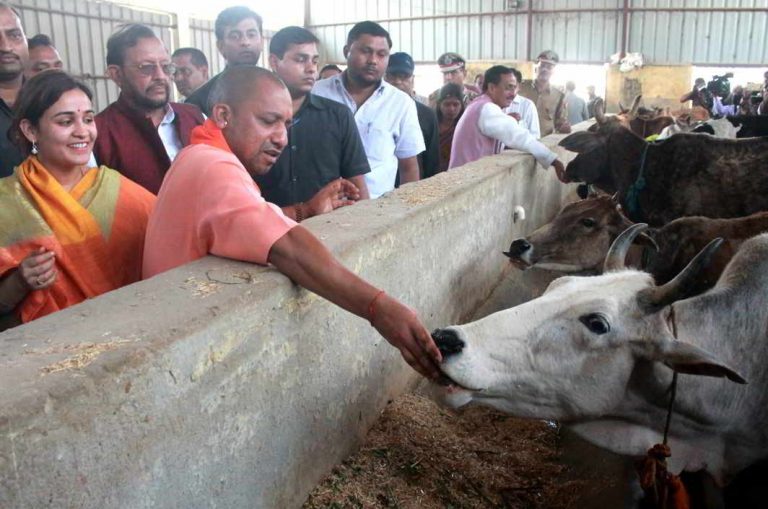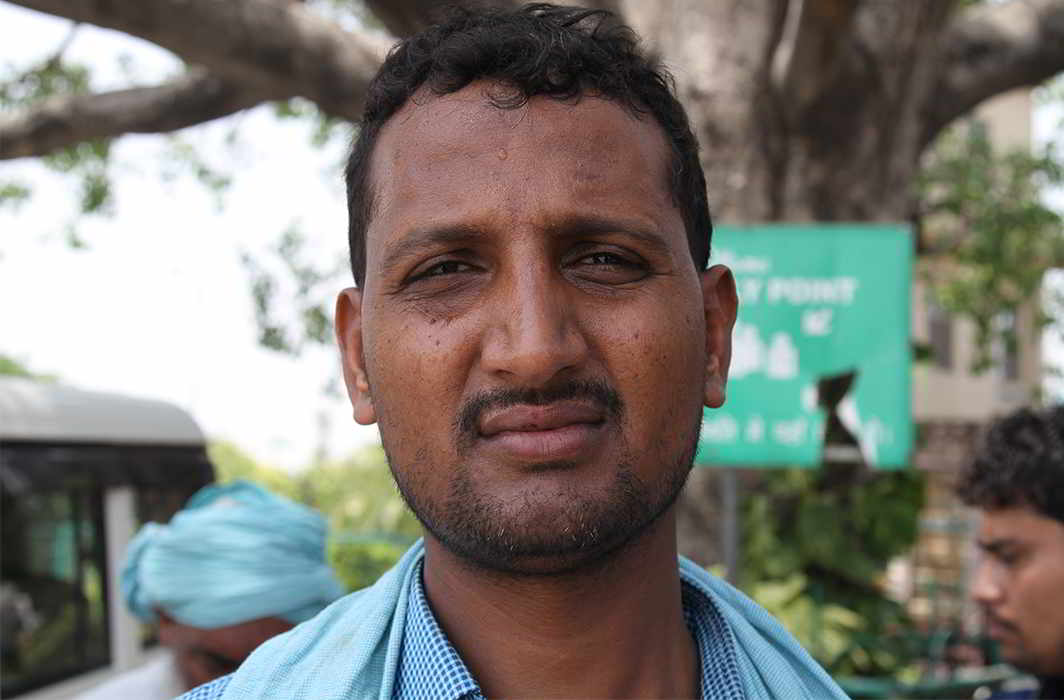
An investigation into the UP government’s crackdown against abattoirs was followed by an adverse comment by the High Court
~By Vivian Fernandes
There are several ironies in Uttar Pradesh’s drive against the illegal slaughtering of animals for meat. A vegetarian chief minister’s concern for the hygiene and quality standards of meat consumed, if not largely at least regularly, by a constituency that is believed not to have voted for him and his party, is quite touching. A similar level of aspiration for the state’s dhabas, restaurants and halwais—those sanctuaries of malign microbes—would have been in alignment with the BJP government’s claim of working for the betterment of all citizens equally without favouring any section of it (Sabka saath, sabka vikaas). That those who gave the BJP a strong majority in the state legislature should accept such double standards is bewildering.
Another paradox is that in the garb of enforcing the law. The state is legally doing unconstitutional acts. This was observed by the Lucknow bench of Allahabad High Court on April 3 while hearing a writ petition against Lakhimpur Kheri’s municipal corporation by a goat meat seller whose retail licence was not being renewed. Food and food habits are part of the right to life, the bench said, which the government could not violate through inaction like not renewing or delaying renewal of licences and other approvals.
Latterly, the government is restricting the supply of livestock to abattoirs in the guise of animal welfare. All the seven export-oriented buffalo meat units in Unnao are shut or near-shut, said Fauzan Alavi, director of Allanasons, the country’s largest buffalo-meat exporting group based in Mumbai. Last year it shipped 4.5 lakh tonnes or a little less than a third of India’s 2015-16 buffalo meat exports of 1.3 million tonnes.
Buffaloes for slaughter cannot be loaded on to trucks without a fitness certificate which the state’s veterinary doctors have to issue. But the doctors are posted at abattoirs and not at penths or animal bazaars. One of Allanasons’ two units in Unnao processed just about 50 buffaloes on May 2, Alavi said, against about a 1,000 daily which it did earlier.
Illegality, in fact, thrives in the name of curbing an illegality. There was a torrent of complaints from buffalo suppliers at the Aligarh plant of Allanasons. Gola Qureshi, a buffalo supplier from Bareilly, said he had to shell out Rs 1,000 (on the day this correspondent met him) to the police at Raya railway crossing near Mathura while transporting animals from Laxminagar penth. This, despite showing them the bill of purchase. The police was aided by 4-5 vigilantes on bikes, he said. If he did not pay up, the police threatened to hand over his animals, 16 of them, worth about Rs 4 lakh to village folk. Recovering them would have been very difficult.
The state is legally doing unconstitutional acts. This was observed by the Lucknow bench of Allahabad High Court on April 3 while hearing a writ petition against Lakhimpur Kheri’s municipal corporation by a goat meat seller whose retail licence was not being renewed.
Naushad, another buffalo supplier, said he was intercepted by the police at the beginning of April while ferrying 10 buffaloes from Ganganpur mandi on Agra road. He offered Rs 200 but the police directed him to the police station. Fearing he would be beaten up, he fled. The driver of the vehicle made a deal for Rs 4,300. This happened in the jurisdiction of Pilua police station.
Abdul Qayyum of Mawan village in Mathura district said he paid Rs 50,000 to Bajrang Dal activists and police at Raya railway crossing on March 27. The maal was released, he said, but the truck is still in their custody. Qayyum said he called up Pooran Prakash, the BJP MLA of Baldev assembly constituency who was willing to plead his case, but the station house officer (SHO) refused to take the call. When Qayyum showed the SHO the supply permit, he was told to “keep it in his pocket”.
Four of seven export-oriented abattoirs in Aligarh were closed on the day this correspondent visited the city. (District officials put the number at 11). Some of them closed down voluntarily in order to meet inadequacies in compliances, rather than risk being sealed by zealous officials motivated by ideology or to establish their loyalty to the new administration. Export units are approved by Apeda, the food products export promotion agency, and FSSAI, the food safety and standards authority. They are also inspected by teams sent by importers. This correspondent found Allanasons’ Aligarh unit neat, clean and disinfected. The only suggestion of its activity was the smell emanating from its rendering plant where animal waste is treated with heated steam.

Slaughterhouses have to meet 17 compliances pertaining to animal welfare, safety of meat during processing, transportation and retailing, pollution control, waste disposal and so on. What constitutes illegality is not clear, says DB Sabharwal, secretary-general of the All India Meat and Livestock Exporters Association. Abattoirs have been closed for CCTVs not working or part of a factory failing to comply with building byelaws. Earlier, deficiencies were pointed out and time was given to rectify them. Sealing of a plant was seldom done, Sabharwal says.
Buffalo meat sellers in Aligarh have also closed down shops voluntarily to avoid getting into trouble with the law. Mohammed Rashid was installing aluminium windows at his hole-in-the-wall at Aligarh’s Turkman Gate neighbourhood. The municipal corporation’s check list for licence renewal included the following: (a) whether the retail outfit is owned or rented out (b) whether the flooring is pucca or not (c) whether the walls are painted (d) distance from school or mandir (e) whether there is a drain in front of the shop (f) whether there is a tap with running water (g) whether there is a glass enclosure or chic (mat of reeds) covering so that carcasses are not exposed.
Aligarh’s only municipal slaughterhouse has been closed since January 2014 as it did not meet pollution control norms. Blood used to be drained into a nala; the offal was treated at a private rendering plant.
According to Tariq Anwar, president of the butchers’ association, Aligarh has 351 buffalo meat shops, out of which nearly 233 had licences last year. SB Singh, Additional District Magistrate (City), says there were 136 licenced buffalo meat retailers.
“There is no shortage of flesh in the city as there are alternate arrangements,” Singh says. To ease people’s hardship, the district administration has directed exporters to divert a part of their production to the local market. Of UP’s 75 districts, only Aligarh has taken this measure, says Alavi.
Aligarh’s only municipal slaughterhouse has been closed since January 2014 as it did not meet pollution control norms. Blood used to be drained into a nala; the offal was treated at a private rendering plant. It was an apology of a slaughterhouse like the rest in the country. The Aligarh administration is now acting with urgency. The effluent treatment plant will be operational in less than two months, says Singh.
Ramzan, Islam’s holy month of fasting, will commence from May 27. If inexpensive buffalo meat is not going to be available, trouble might be stirred by criminals in the Muslim and Hindu communities. There is anger in UP’s Muslim community. It is waiting for an escape vent.
—The writer is editor of www.smartindianagriculture.in

